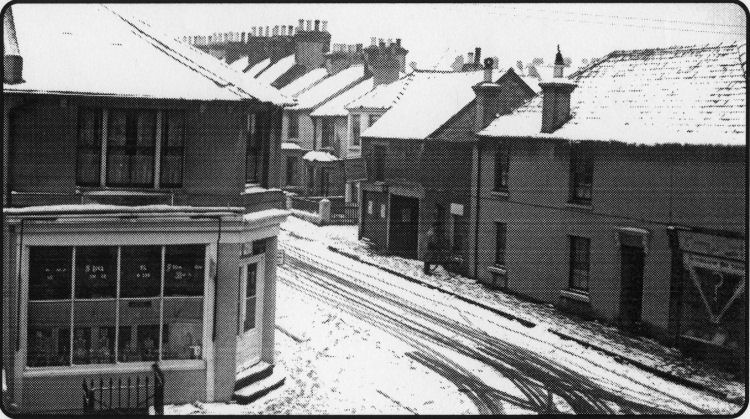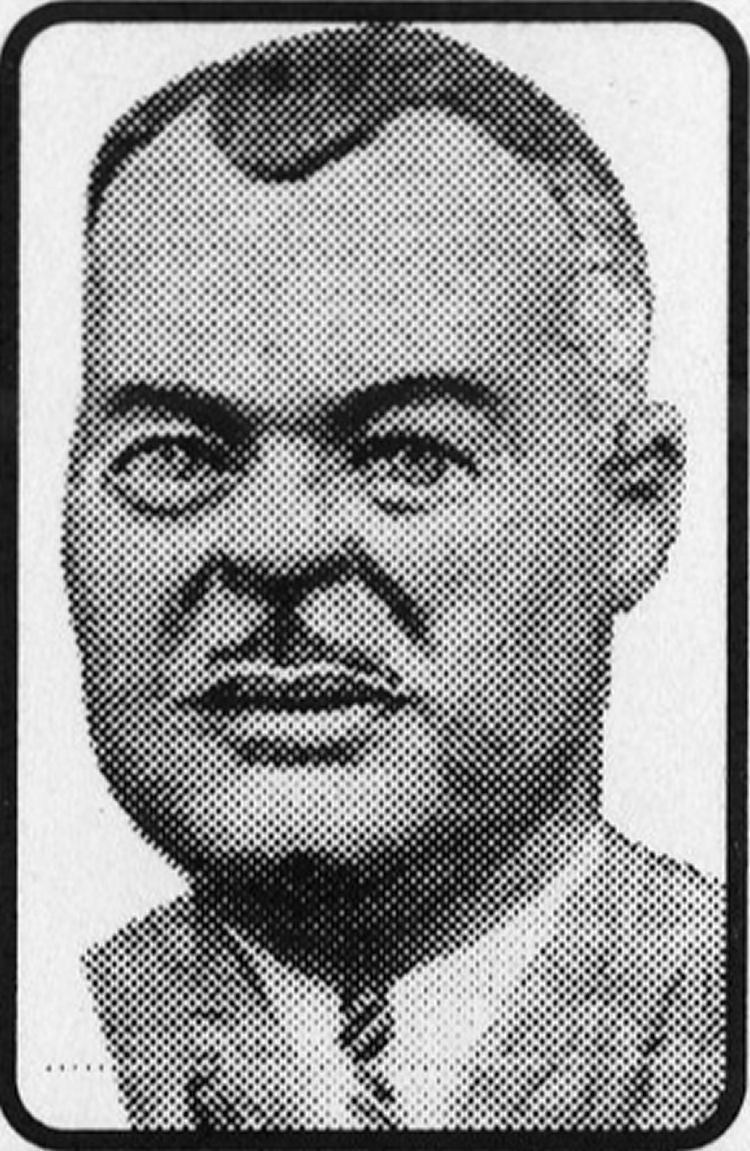Page Updated:- Sunday, 07 March, 2021. |
||||||||||
 From the Folkestone Herald Published 13 January 2000 Born survivor. DOUG ‘Denny’ Denham, a retired Folkestone businessman who was once the biggest electrical retailer/contractor in the town, is a born survivor, having cheated death several times. 
DENMARK Street where Doug Denham started on his way as a self-made entrepreneur, in the basement of Sharp’s Dairy’s milk shop, on the left run by his father, making bicycles. He later took over the workshops of the property opposite and eventually opened up a shop in the property adjoining. Snow was lying on the ground when this picture was taken in 1939. By the time Doug decided to retire, his business had opened 17 shops in Kent. He sold 2 Denmark Street in 1981.
He survived the Japanese invasion of Malaya and Singapore, only to become a PoW in the death camps of Sumatra. He was a survivor too of one of the worst sea disasters of the war 1944 when a British warship torpedoed and sank a cargo ship carrying 7,000 prisoners of the Japanese including PoWs. Nearly 6,000 died. Doug was one of 273 British PoWs among the 1,000 odd survivors, made up of Australian, Dutch, Javanese and Brits. Survivors lived to endure the horror of Japanese death camps. Doug, 83, who lives in Wimbome, Dorset, also survived a bad attack of malaria combined with other tropical diseases and his remarkable recovery from diptheria in one camp he put down to ‘Lady Luck.’ That was in the unlikely form of four dairy cows which had been kept by nuns. Their milk - rare in that part of the world - was the one thing that saved him, he believes. And it was probably his illness and slow recovery from diptheria -with a spell in an isolation ‘ward’ -which saved him from death at the hands of the brutal Japanese army on the Sumatra railway. This was built by the PoWs at the cost of many hundreds of lives. Then he cheated death again when a fellow PoW, Ken Billington, dived into a river to free his unconscious body from where it was trapped among the submerged roots of a fallen tree while swimming. And he was miraculously revived. He also survived devastating Japanese bombing attacks on RAF air fields in Malaya and then again, just before capture, when his lorry ran into the rear of a stationary armoured car in the dark while carrying a load of booze they were trying to keep out of enemy hands. He escaped with broken ribs and a dislocated shoulder. 
This cartoon figure of Doug Denham appeared in the Electrical & Radio Trading magazine of September 1953 in which his business success was reviewed. Trained as an engineer in the RAF his flare for business took off when he entered the radio, television and electrical goods trade.
Missed the boat. A man of initiative - Doug began work before he left school building bicycles and selling them to fellow classmates. But it was initiative that nearly cost him his life, for it led to his worst ever mistake in the War. He and his best pal literally ‘missed the boat’ - to freedom. Serving in the RAF"s No 488 NZ Squadron and looking for something interesting to do, as the Japanese came ever neater, he and his best pal Jimmy Delap, volunteered for the job of training Dutch Indies Army troops to be dispatch riders, but it was some distance away from their camp at Batavia (now called Jakarta, capital of Indonesia.) When the chance came for their RAF Squadron to pull out aboard the Blue Star Line’s 'Empire Star' to escape the Japanese invasion, Doug and his mate were left behind. They were unable to get back in time to join their comrades who escaped to New Zealand to fight again. The two men spent three and a half years as PoWs of the Japanese. But Doug survived the building of the railway of death during which so PoWs a day were dying and being buried as starvation, disease and brutality took its toll. More than half the PoWs died in the first two years in the Sumatra death camps. Doug recalls it was the day war officially ended that the Sumatra railway was completed at Moera with the joining up of the last rails with ‘gold’ sleeper ‘dogs’ - actually made of scrap brass by his mate Bill ‘Jock’ Gunn in the workshops. But it wasn’t until the next day the prisoners heard the Japanese Emperor had surrendered his forces and the war was over. Doug remembers huge baskets of fruit were being dished out to prisoners and at first PoWs thought this was to show how pleased the Japanese were with the railway. Truth began to dawn when Doug, escorted by a Japanese army sergeant, went through the army’s barrack block to retrieve his watchmaking tools from the store where he worked and Japanese soldiers, burning private papers, stopped to bow. He told the PoWs’ commanding officer and soon the Japanese commander admitted the war was over. If confirmation was needed, it came in the form of canisters of food and leaflets quickly dropped by the Allied Forces’ Liberator aircraft. These gave the PoWs advice on what to do until the Allied troops could take over. Doug treasures a copy as a memento of the war. But sadness was to follow his release. News leading aircraftsman Doug Denham survived the fall of Singapore, did not reach his family until an official letter addressed to his wife, Kathleen, arrived at the end of September 1945. (They were married in 1939.) Sadly, while Doug had been a PoW his wife had contracted TB. He did not know because the Japanese had held back all the prisoners’ mail.
Flown home. Two weeks after the war ended, on September 24, Doug and fellow PoWs headed for home on board the SS Antenor. Reaching the Red Sea his homecoming was speeded up. He got star treatment. After getting a train to Cairo he was flown home via Malta to be re-united with his sick wife but she died on Boxing Day 1945. Doug made up for lost time in the field of business, after the war and had four companies under his belt in East Kent when he made the decision to retire 30 years ago. At 83 he can look back on three marriages, and has two sons, three daughters, six grandchildren and one great-grandchild. Over Christmas he visited his eldest son Martin, 52, of Tormore Park, Deal, and his sister Joyce, 79, living in Folkestone. Joyce is the widow of John Reynolds who was manager of Denhams former contracting company. Sadly, he died about a year ago. For more about Doug’s story see Memories next week!
|
||||||||||
|
If anyone should have any a better picture than any on this page, or think I should add one they have, please email me at the following address:-
|
||||||||||
| LAST PAGE |
|
MENU PAGE |
|
NEXT PAGE | ||||||
